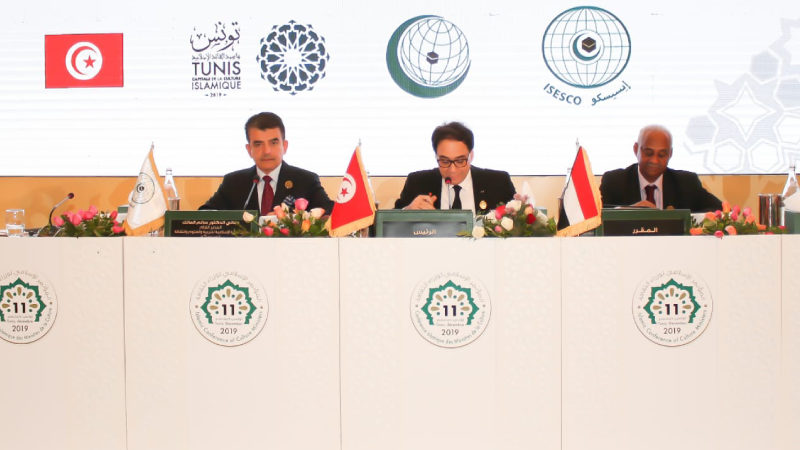
ICCM closed with release of Tunis Declaration

18 December 2019
** Extraordinary session in Cairo next year to mark the city’s celebration as Islamic Culture Capital.
The 11th Islamic Conference of Culture Ministers closed its proceedings today by adopting, after examination, its final report and resolutions, composing its Bureau and releasing Tunis Declaration for the Reform of Present Cultural Policies in the Islamic World.
The Conference participants accepted the offer made by the Arab Republic of Egypt to host an extraordinary session in Cairo next year to mark the city’s celebration as the Arab region’s Islamic Culture Capital for 2020.
The Conference welcomed the project of the creation of the OIC Platform for the Protection of Cultural Heritage in the Muslim World as a coordination mechanism to showcase ISESCO’s efforts as a specialized organization through its observatory and committee for heritage in the Islamic world; and highlight the relevant efforts of the Research Centre for Islamic History Art and Culture (IRCICA).

The Conference also welcomed Kazakhstan’s initiative to commemorate the 1150th birthday of the renowned philosopher Al–Farabi and the 2200th anniversary of the city of Shymkent.
Moreover, the Conference approved the Final Report of the 17th Meeting of the Consultative Council for Cultural Development in the Islamic World; ISESCO’s Report on its Achievements in Cultural Fields between 10th and 11th sessions of the Conference; the Report of the Islamic World Heritage Committee; the Guidance Document on Digital Culture: Prospects and Challenges; and the Practical Proposals on Parallel Funding Sources for Cultural Projects.
Likewise, the Conference formed its Bureau with Tunisia as a Chair; Burkina Faso, Egypt and Kazakhstan Vice-Chairs; and the Sudan as Rapporteur. The participants also elected the members of the Consultative Council for Cultural Development in the Islamic World for a two-year term as follows: United Arab Emirates, Qatar and Libya for the Arab region; Brunei Darussalam, Uzbekistan and Afghanistan for the Asian region; and Cameroon, Uganda and Gabon for the African region.
At the closing session, the Tunisian Minister of Cultural Affairs, Dr. Mohamed Zine El Abidine, delivered an address wherein he thanked ISESCO for its efforts to ensure the success of the Conference and to the participating delegations for their endeavors to issue such important resolutions.

Then, Dr. Salim M. AlMalik, ISESCO Director General, read out the participants’ message of thanks and gratitude to His Excellency Mr. Kaïs Saïed, President of the Republic of Tunisia, for his patronage to the Conference and support to ISESCO to fully discharge its missions in its areas of competence.
By the same token, Dr. AlMalik made an address congratulating the participating delegations on the success of the Conference and achievement of its objectives thanks to the concerted efforts made by them and the General Directorate to advance joint Islamic cultural action, embodied in the resolutions issued.
“Our common will to upgrade working mechanisms to attain these objectives was clearly manifested in this session. We have moved from the usual traditional methods to a new phase of concrete field cultural action to meet the real needs of our Member States”, he added.



